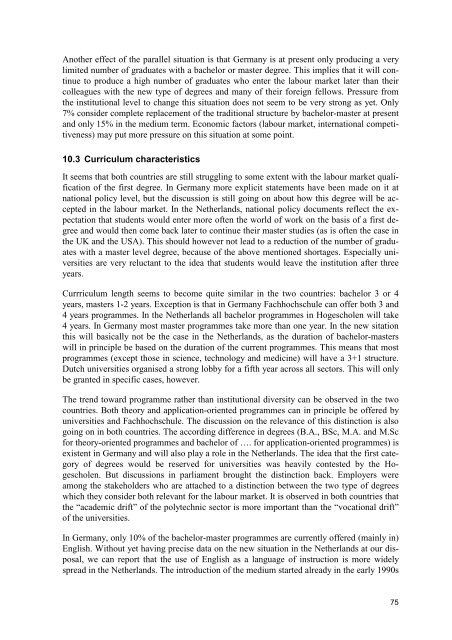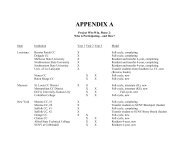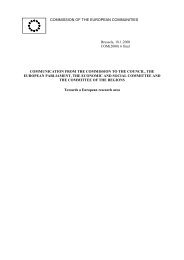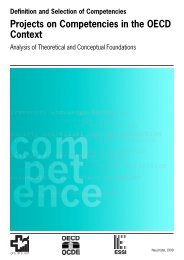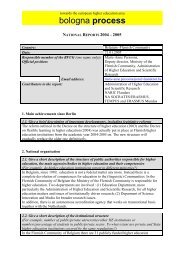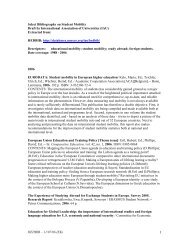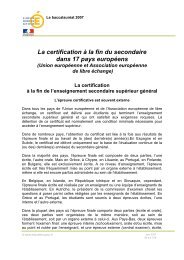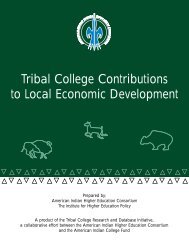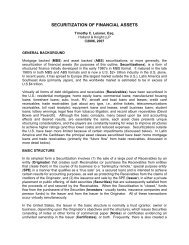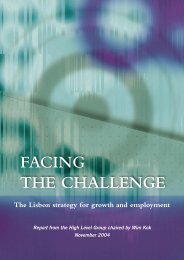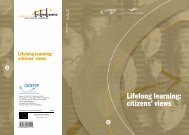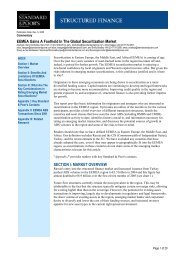and Master Programmes in German Higher Education Institutions
and Master Programmes in German Higher Education Institutions
and Master Programmes in German Higher Education Institutions
- No tags were found...
You also want an ePaper? Increase the reach of your titles
YUMPU automatically turns print PDFs into web optimized ePapers that Google loves.
Another effect of the parallel situation is that <strong>German</strong>y is at present only produc<strong>in</strong>g a verylimited number of graduates with a bachelor or master degree. This implies that it will cont<strong>in</strong>ueto produce a high number of graduates who enter the labour market later than theircolleagues with the new type of degrees <strong>and</strong> many of their foreign fellows. Pressure fromthe <strong>in</strong>stitutional level to change this situation does not seem to be very strong as yet. Only7% consider complete replacement of the traditional structure by bachelor-master at present<strong>and</strong> only 15% <strong>in</strong> the medium term. Economic factors (labour market, <strong>in</strong>ternational competitiveness)may put more pressure on this situation at some po<strong>in</strong>t.10.3 Curriculum characteristicsIt seems that both countries are still struggl<strong>in</strong>g to some extent with the labour market qualificationof the first degree. In <strong>German</strong>y more explicit statements have been made on it atnational policy level, but the discussion is still go<strong>in</strong>g on about how this degree will be accepted<strong>in</strong> the labour market. In the Netherl<strong>and</strong>s, national policy documents reflect the expectationthat students would enter more often the world of work on the basis of a first degree<strong>and</strong> would then come back later to cont<strong>in</strong>ue their master studies (as is often the case <strong>in</strong>the UK <strong>and</strong> the USA). This should however not lead to a reduction of the number of graduateswith a master level degree, because of the above mentioned shortages. Especially universitiesare very reluctant to the idea that students would leave the <strong>in</strong>stitution after threeyears.Currriculum length seems to become quite similar <strong>in</strong> the two countries: bachelor 3 or 4years, masters 1-2 years. Exception is that <strong>in</strong> <strong>German</strong>y Fachhochschule can offer both 3 <strong>and</strong>4 years programmes. In the Netherl<strong>and</strong>s all bachelor programmes <strong>in</strong> Hogescholen will take4 years. In <strong>German</strong>y most master programmes take more than one year. In the new sitationthis will basically not be the case <strong>in</strong> the Netherl<strong>and</strong>s, as the duration of bachelor-masterswill <strong>in</strong> pr<strong>in</strong>ciple be based on the duration of the current programmes. This means that mostprogrammes (except those <strong>in</strong> science, technology <strong>and</strong> medic<strong>in</strong>e) will have a 3+1 structure.Dutch universities organised a strong lobby for a fifth year across all sectors. This will onlybe granted <strong>in</strong> specific cases, however.The trend toward programme rather than <strong>in</strong>stitutional diversity can be observed <strong>in</strong> the twocountries. Both theory <strong>and</strong> application-oriented programmes can <strong>in</strong> pr<strong>in</strong>ciple be offered byuniversities <strong>and</strong> Fachhochschule. The discussion on the relevance of this dist<strong>in</strong>ction is alsogo<strong>in</strong>g on <strong>in</strong> both countries. The accord<strong>in</strong>g difference <strong>in</strong> degrees (B.A., BSc, M.A. <strong>and</strong> M.Scfor theory-oriented programmes <strong>and</strong> bachelor of …. for application-oriented programmes) isexistent <strong>in</strong> <strong>German</strong>y <strong>and</strong> will also play a role <strong>in</strong> the Netherl<strong>and</strong>s. The idea that the first categoryof degrees would be reserved for universities was heavily contested by the Hogescholen.But discussions <strong>in</strong> parliament brought the dist<strong>in</strong>ction back. Employers wereamong the stakeholders who are attached to a dist<strong>in</strong>ction between the two type of degreeswhich they consider both relevant for the labour market. It is observed <strong>in</strong> both countries thatthe “academic drift” of the polytechnic sector is more important than the “vocational drift”of the universities.In <strong>German</strong>y, only 10% of the bachelor-master programmes are currently offered (ma<strong>in</strong>ly <strong>in</strong>)English. Without yet hav<strong>in</strong>g precise data on the new situation <strong>in</strong> the Netherl<strong>and</strong>s at our disposal,we can report that the use of English as a language of <strong>in</strong>struction is more widelyspread <strong>in</strong> the Netherl<strong>and</strong>s. The <strong>in</strong>troduction of the medium started already <strong>in</strong> the early 1990s75


